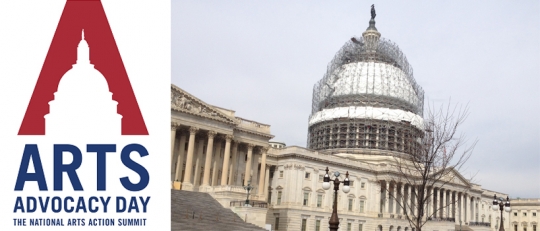
On Tuesday, March 8, more than 500 grass roots advocates celebrated Arts Advocacy Day in Washington D.C. Arts Advocacy Day is instrumental in advancing key legislative initiatives and arts education policies. In a unified effort, arts advocates from 45 states met with congressional representatives and staffers on Capitol Hill and discussed how important the arts are to our communities, how much arts education means to our future, and how the arts improve our daily lives. Young Audiences Arts for Learning was proud to be a national sponsor for the 29th Arts Advocacy Day organized by Americans for the Arts.
Americans for the Arts has a wealth of information for arts advocates. I encourage anyone who appreciates the arts to learn more about how the arts promote economic and civic prosperity. For instance, did you know that the arts drive tourism and strengthen the economy? Arts attendees spend an average of $24.60 per person, not including the event fee. That means that every time someone sees a play or goes to a museum they are spending money on food, parking, babysitters, and souvenirs. Local merchants are being supported by the arts in a big way.
Check out the Congressional Arts Handbook; it is a go-to resource for grass roots advocates. Remember, you can contact your congressional representative at any time throughout the year about arts related issues in your community. It is our duty to reach out and communicate the value of arts and arts-in-education and create those meaningful relationships with our local, state, and national representatives.
The John F. Kennedy Center for the Performing Arts
On Monday evening during the 2-day event, I attended the annual Nancy Hanks Lecture at the Kennedy Center featuring John Maeda, the designer, technologist and catalyst behind the national STEAM movement. During the lecture, Maeda discussed his personal history and why he pushed STEAM programming to the forefront of the education field. He is a brilliant man, who is always searching for the next creative challenge. And as we continue advocating for the arts in the year to come, I will echo John Maeda’s thoughts, “it is time to take the next step”.

